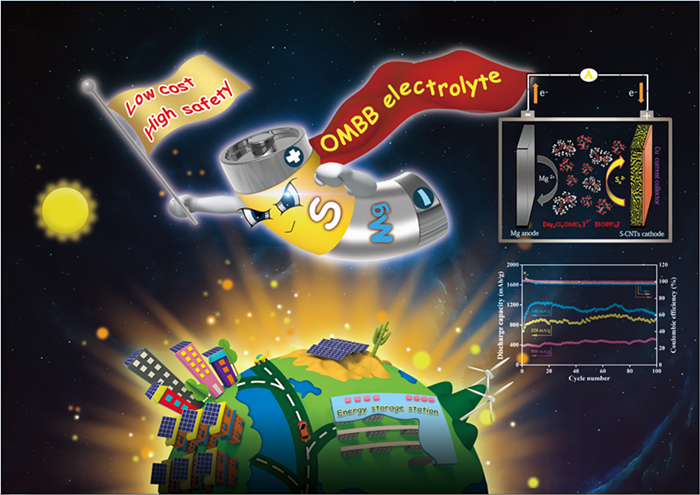As regards the demand for energy storage batteries, higher energy density and safer property has been the imperative target with the rapid market expansion of electric vehicles and grid-scale storage systems. Among various new battery technologies, rechargeable Mg battery has attracted increasing attention from researchers. Mg anode inherently possesses incomparable superiorities which are high safety, high volumetric capacity, earth-abundant element (the fifth most abundant in the earth crust) and low cost (about 30 times cheaper than Li). Nevertheless, the lack of compatible electrolytes and suitable cathodes has restricted the further development of rechargeable Mg battery.
Particularly in recent years, the widely studied sulfur as conversion-type cathode material has exhibited great potential for exploitation in rechargeable magnesium batteries. Magnesium/sulfur coupling battery system is charming because its theoretical energy density overwhelms four times of the commercial LiCoO2/graphite battery. Despite these merits, actually the development of Mg/S battery is still in the infancy owing to the lack of compatible electrolytes. Until now, there is no electrolyte presents the acceptable capacity retention after 100 charge-discharge cycles at an appropriate charge-discharge rate.
Recently, a research team from Qingdao Institute of Bioenergy and Bioprocess Technology(QIBEBT) of the Chinese Academy of Sciences exploited a new type of organic magnesium borate based electrolyte which was synthesized via a facile in-situ reaction of tris(hexafluoroisopropyl)borate [B(HFP)3], MgCl2 and Mg powders in 1,2-dimethoxyethane (DME).
Through rigorous analyses, the as-prepared Mg-ion electrolyte exhibited unprecedented Mg plating/stripping performances, such as high anodic stability up to 3.3 V (vs. Mg/Mg2+), high ionic conductivity of 5.58 mS·cm–1, low overpotential of 0.11 V for plating process and above 98% Coulombic efficiencies. By virtue of the non-nucleophilic feature, this electrolyte is well compatible with sulfur positive electrodes.
Magnesium sulfur batteries assembled using this electrolyte is firstly demonstrated to endure more than 100 cycles without obvious capacity decay and to enable fast conversion process, even at the charging current density up to 500 mA·g–1. The findings convincingly validate the pivotal role of newly designed non-nucleophilic Mg-ion electrolyte for practical Mg/S battery chemistry.
Related work was published in Energy& Environment Science. This study was supported by the National Distinguished Young Scientists Program from NSFC (51625204).

The schematic diagram of Magnesium/sulfur battery with the organic magnesium borate based (OMBB) electrolyte. (Image by DU Aobing)




